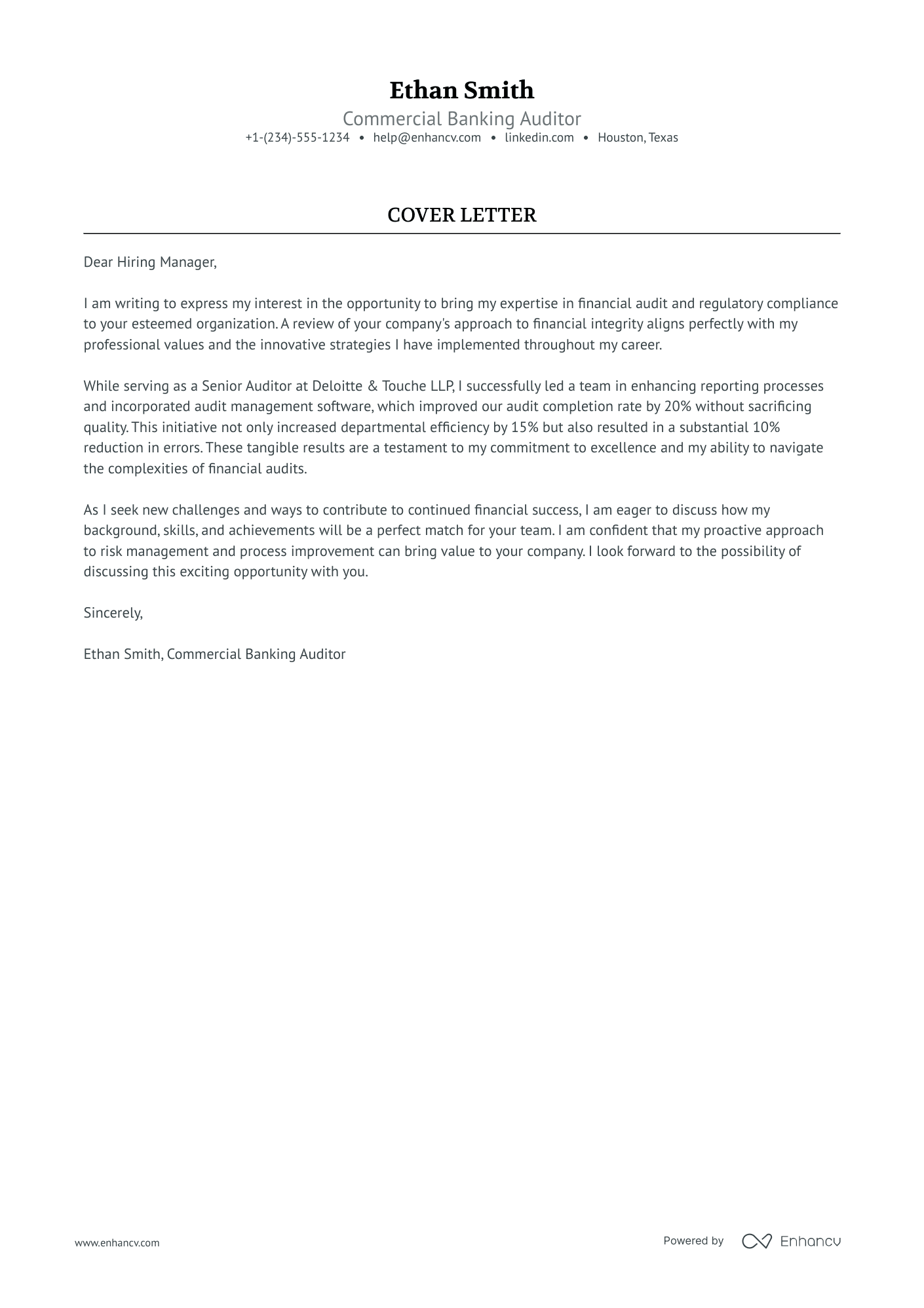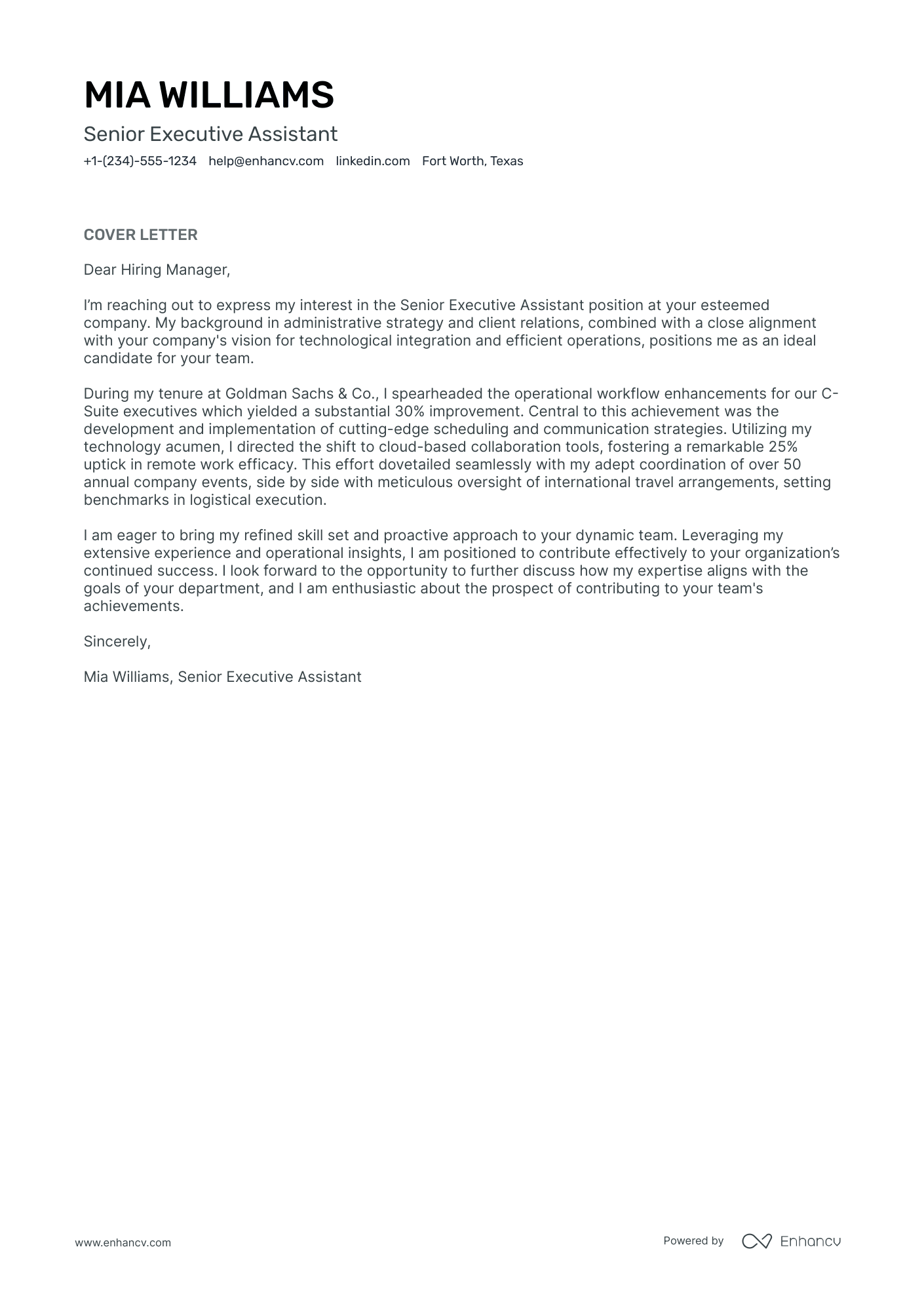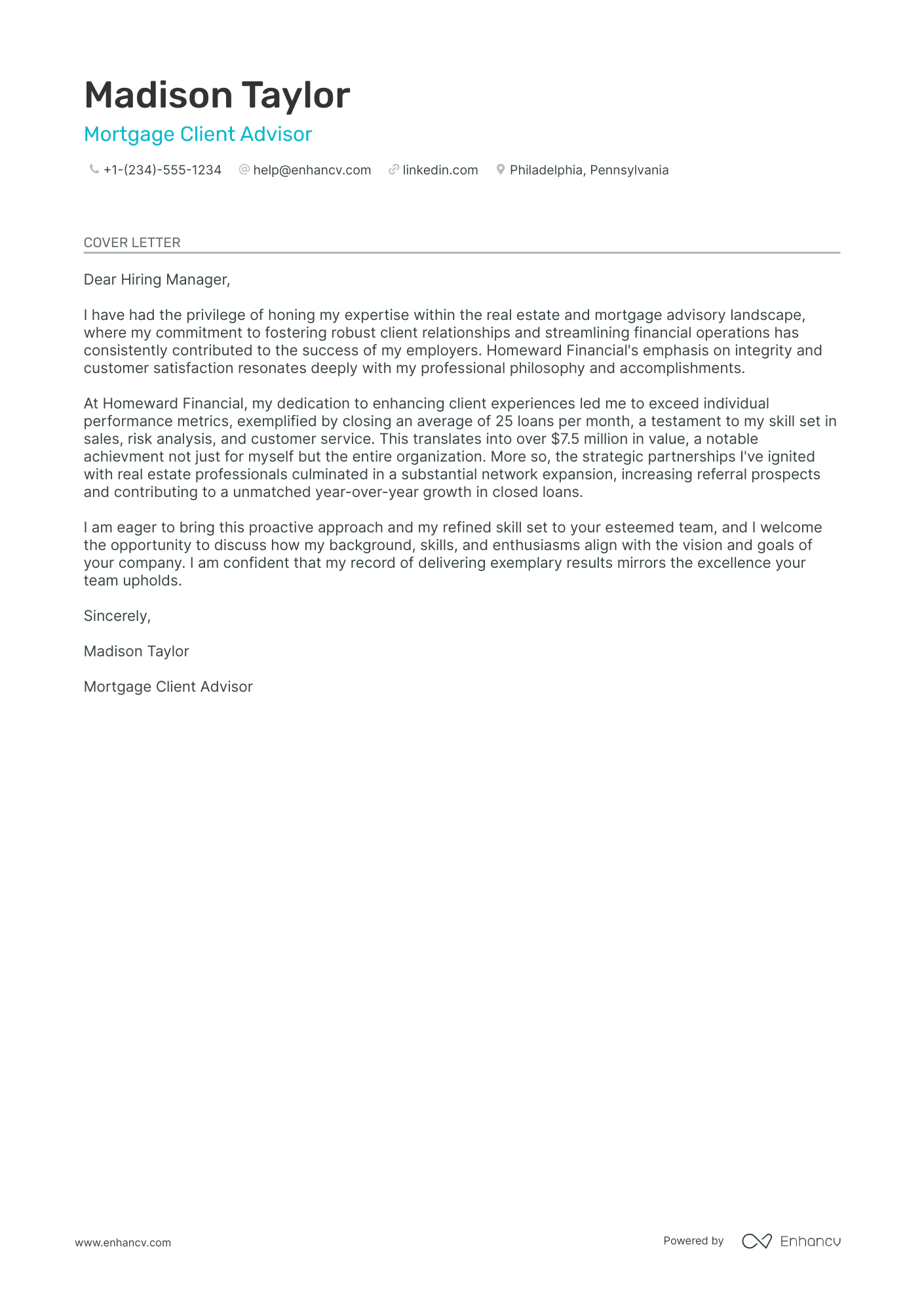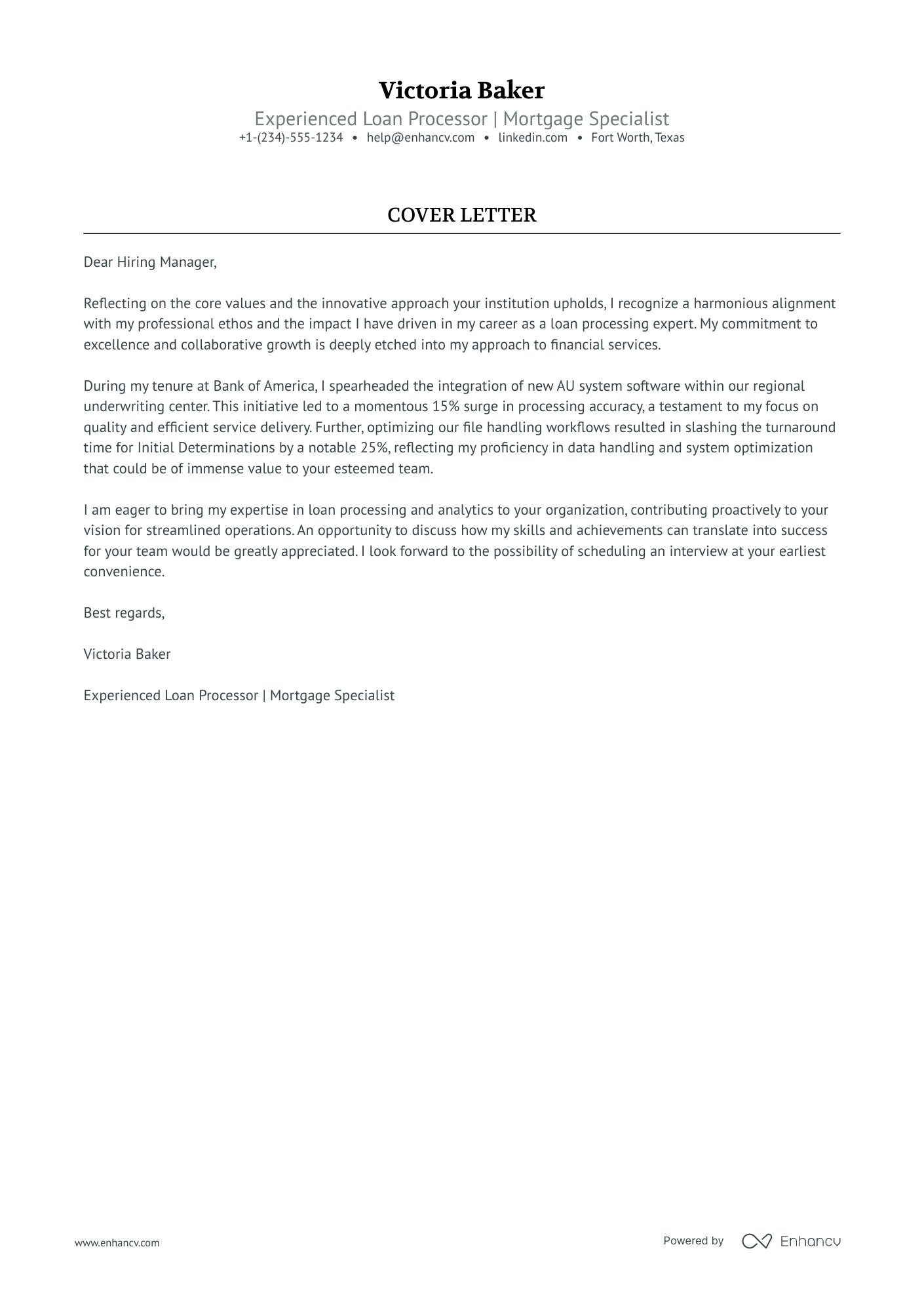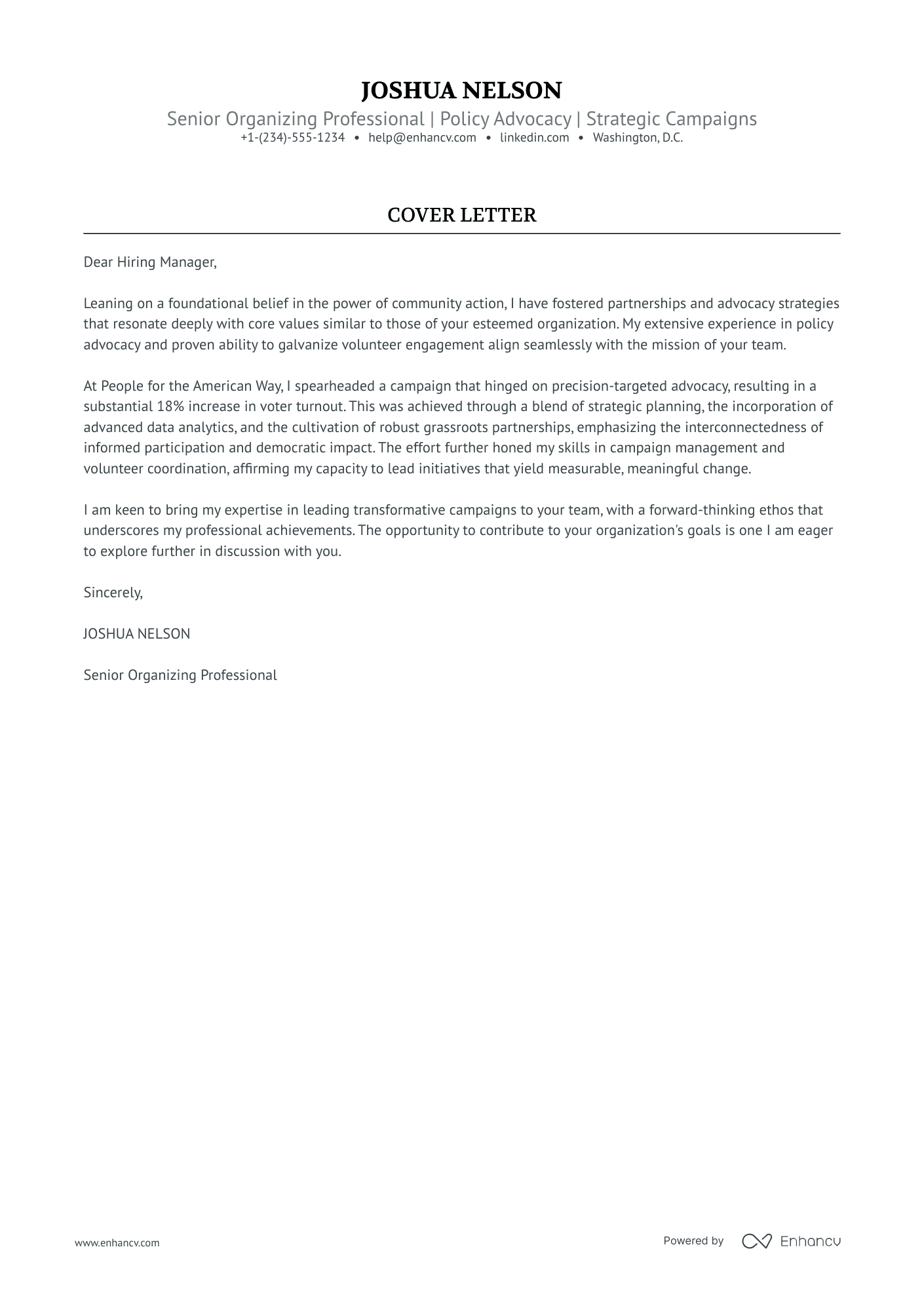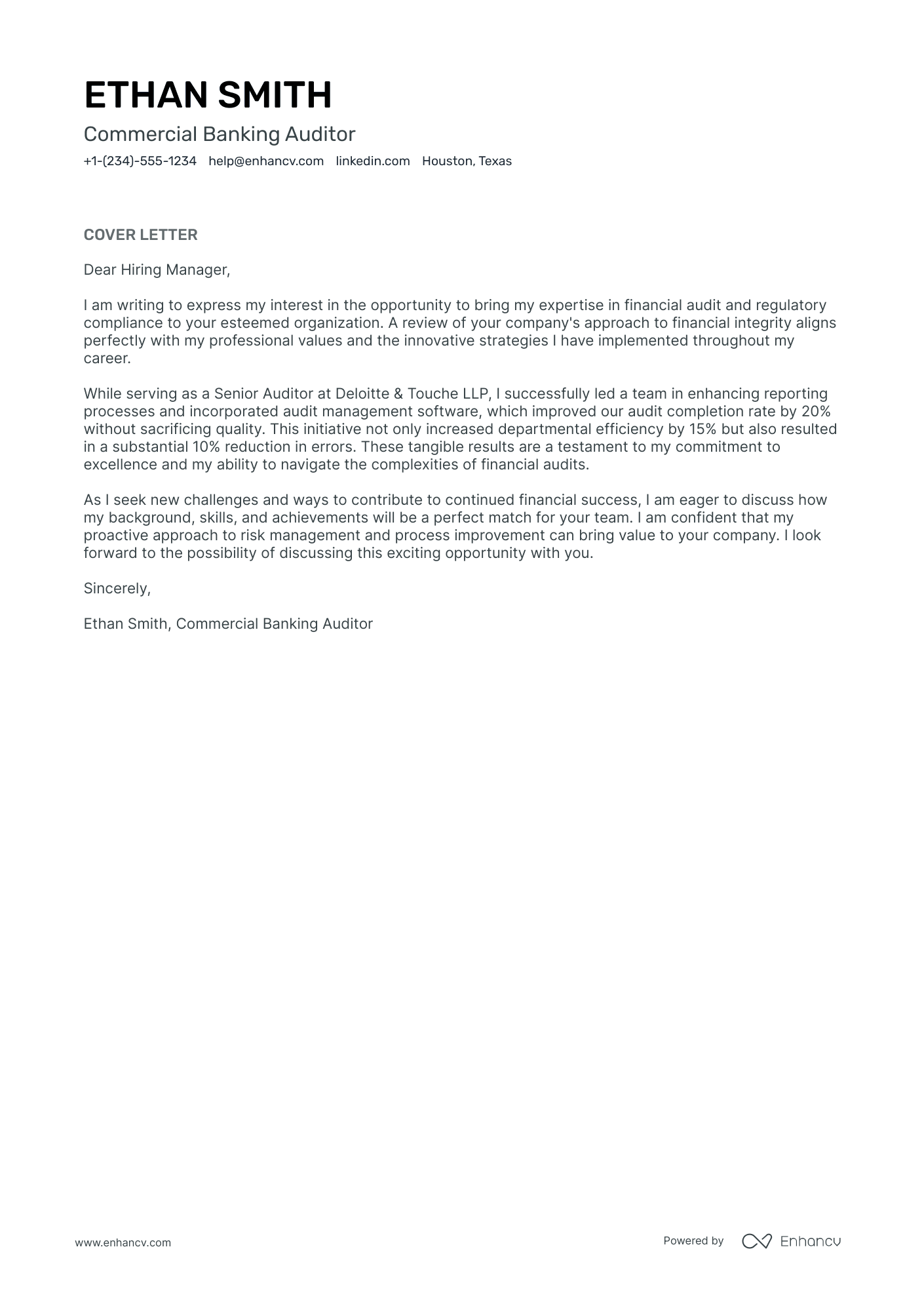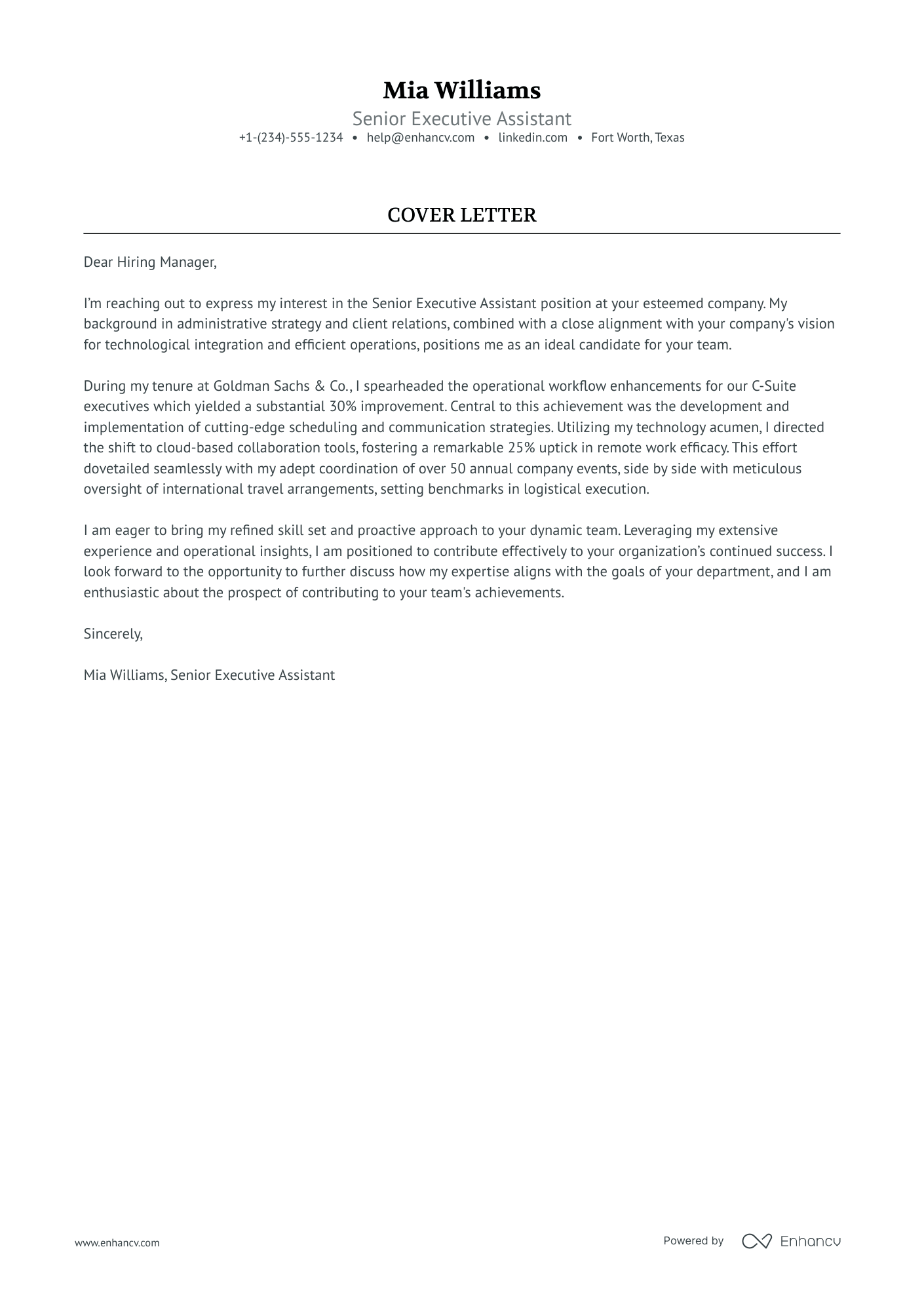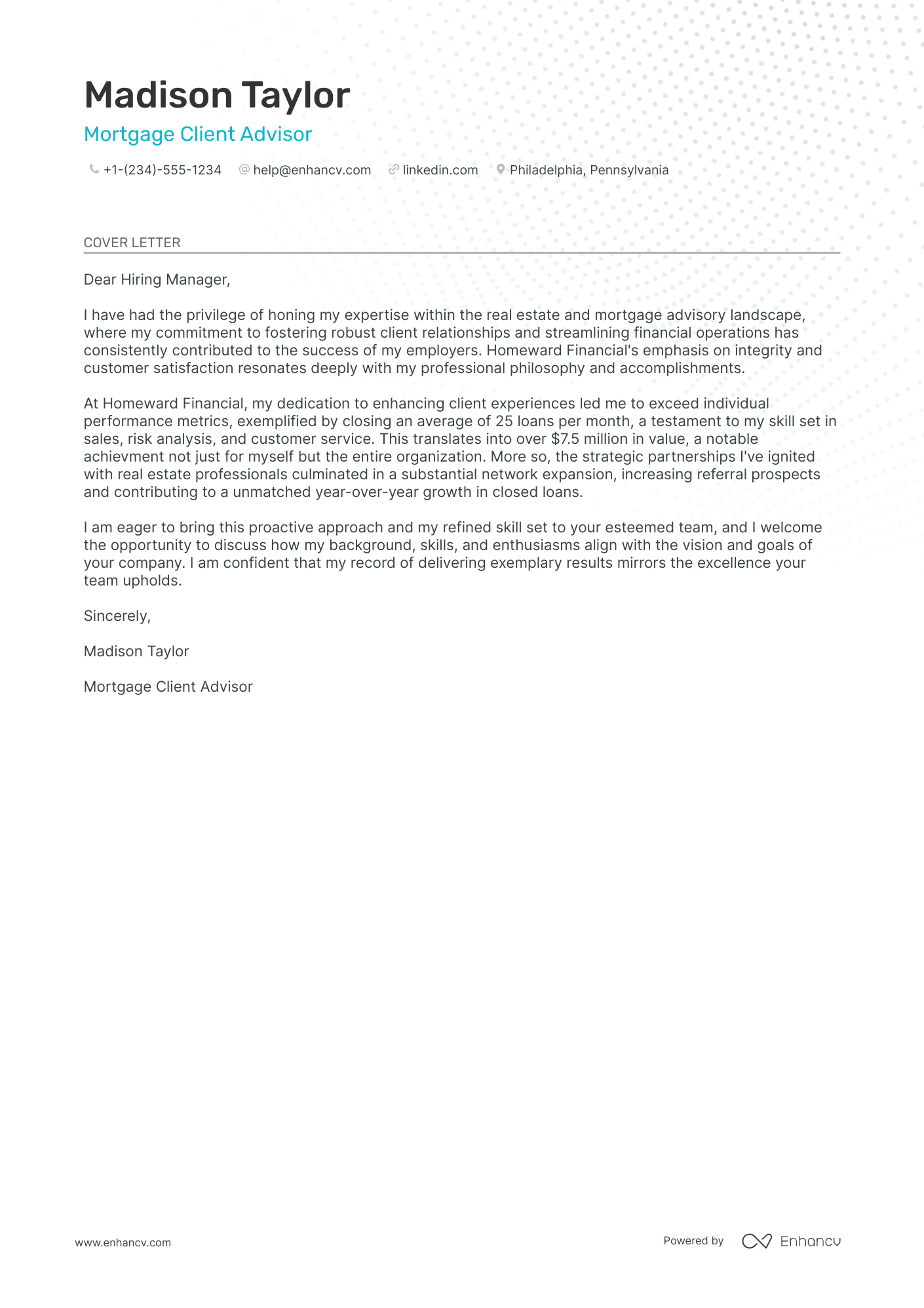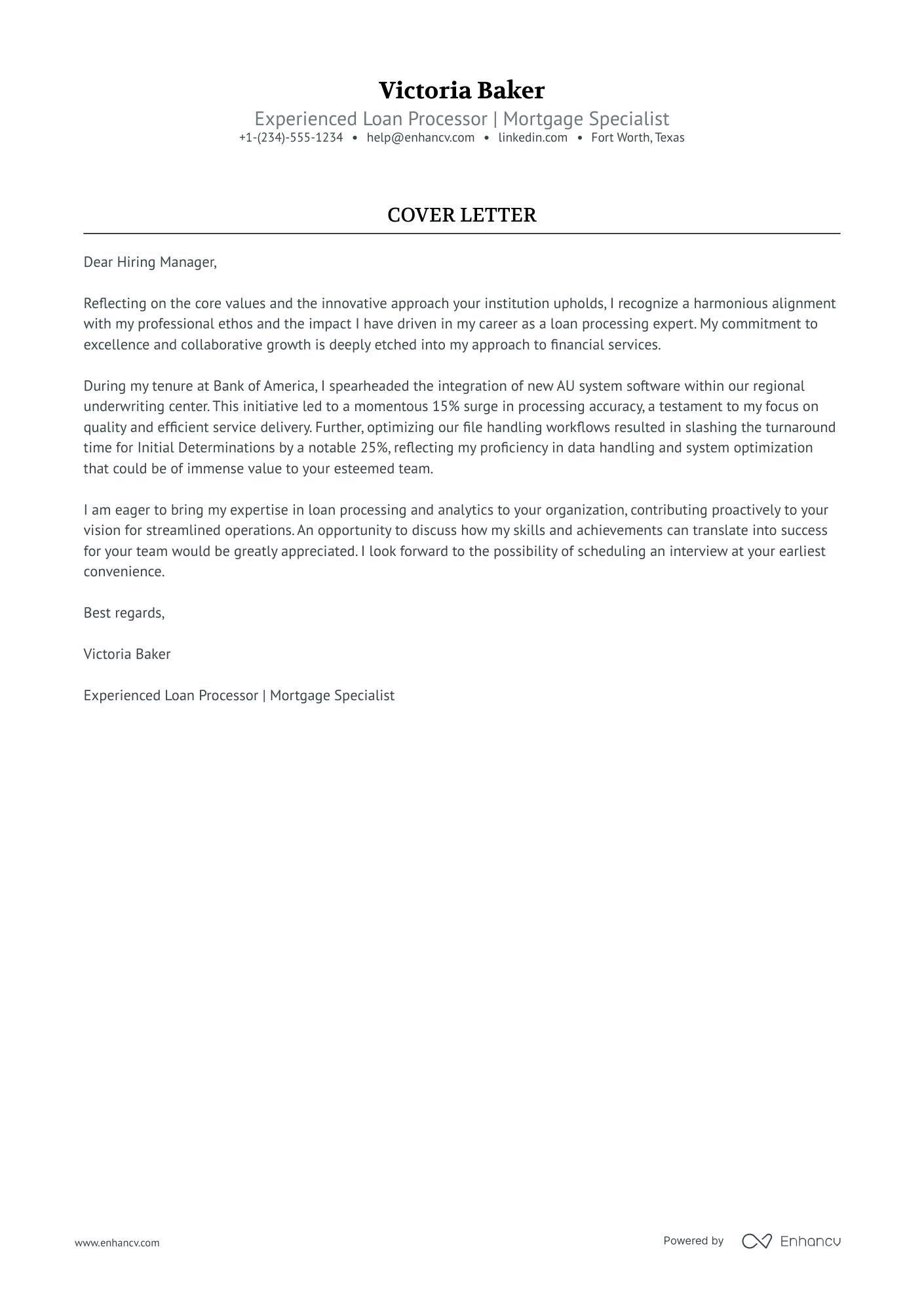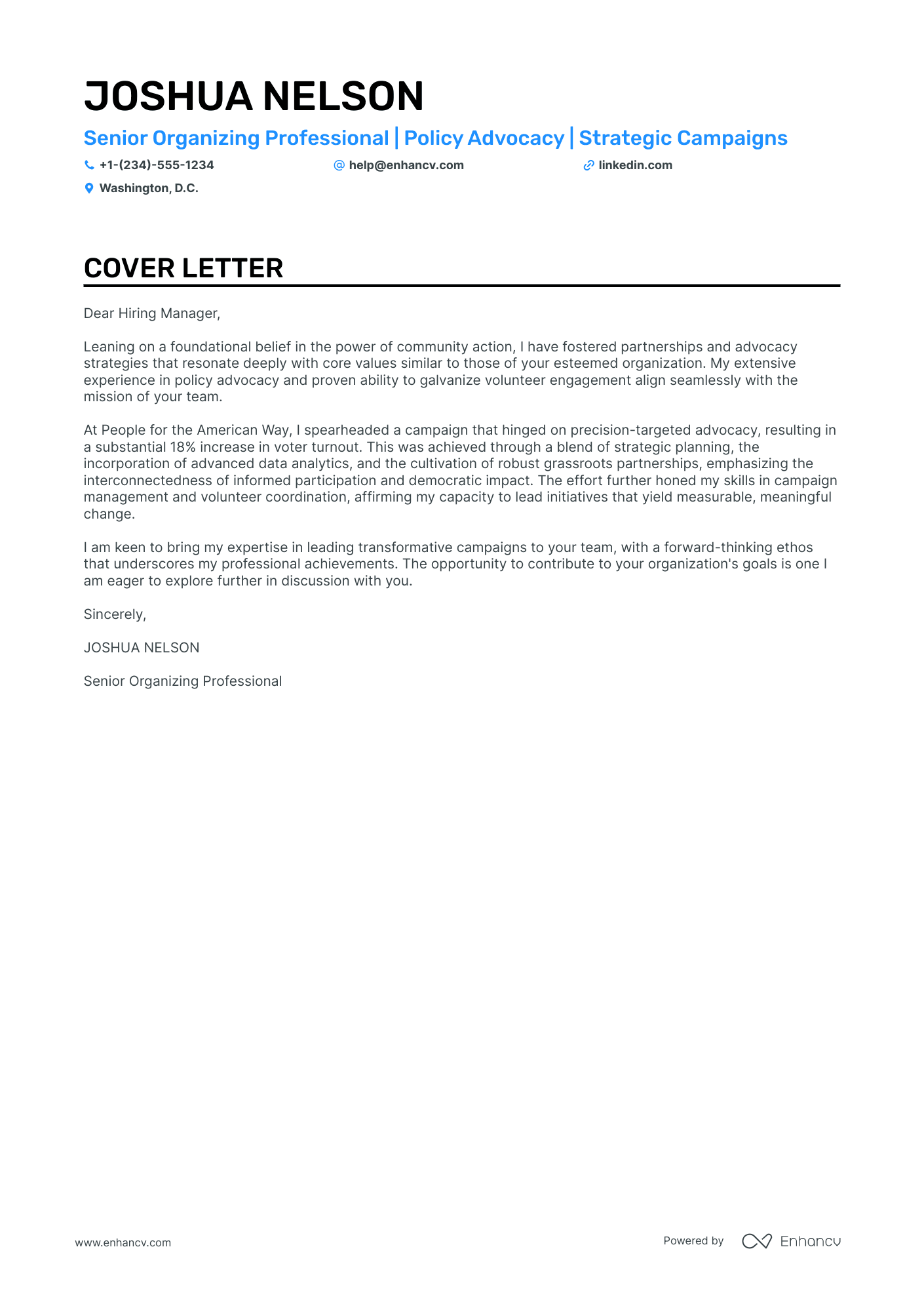Crafting a banking cover letter can often feel daunting. You might have already dived into job applications, only to realize a punchy cover letter is a must-have. It's not about echoing your resume; it's about showcasing a key professional triumph and bringing your journey to that success to life. Remember, formality is key, but dodging clichés will make you stand out. And keeping it concise to one page is crucial. Let's guide you through writing a cover letter that opens doors.
- Create a banking cover letter to persuade the recruiters you're the best candidate for the role;
- Use industry-leading banking cover letter templates and examples to save time;
- Dedicate your banking cover letter space to your best achievement;
- Make sure your banking cover letter meets recruiters' expectations and standards.
Avoid starting at the blank page for hours by using Enhancv's AI - just upload your resume and your banking cover letter will be ready for you to (tweak and) submit for your dream job.
If the banking isn't exactly the one you're looking for we have a plethora of cover letter examples for jobs like this one:
- Banking resume guide and example
- Financial Accountant cover letter example
- Public Accounting Auditor cover letter example
- Finance Coordinator cover letter example
- Corporate Accounting cover letter example
- Bank Manager cover letter example
- VP of Finance cover letter example
- Tax Manager cover letter example
- Cost Accounting cover letter example
- Finance Manager cover letter example
- Tax Director cover letter example
Drop your resume here or choose a file.
PDF & DOCX only. Max 2MB file size.
Banking cover letter example
Alex Johnson
New York, NY
+1-(234)-555-1234
help@enhancv.com
- Explicitly stating relevant previous experience, such as managing relationships with over 500 customers at Chase Bank, provides concrete evidence of capability in the field and assures the hiring manager of the candidate's qualifications for the customer relationship role.
- Quantifying achievements, like citing a 95% customer satisfaction rate and a 30% reduction in customer complaints, helps to objectively demonstrate the candidate's impact and effectiveness in the previous position.
- Identifying a specific initiative, such as leading the integration of a new CRM system, exhibits the candidate’s ability to innovate and improve processes, which could translate into similar successes in the new role.
- Expressing eagerness to apply strategic vision and skills to the potential employer's institution, and aligning personal commitment with the company's core values, shows the hiring manager that the candidate is not only qualified but also genuinely interested in the company's mission.
What about your banking cover letter format: organizing and structuring your information
Here is one secret you should know about your banking cover letter assessment. The Applicant Tracker System (or ATS) won't analyze your cover letter.
You should thus focus on making an excellent impression on recruiters by writing consistent:
- Header
- Greeting
- Introduction
- Body paragraphs (and explanation)
- Promise or Call to action
- Signature (that's optional)
Now, let's talk about the design of your banking cover letter.
Ensure all of your paragraphs are single-spaced and have a one-inch margins on all sides (like in our cover letter templates).
Also, our cover letter builder automatically takes care of the format and comes along with some of the most popular (and modern) fonts like Volkhov, Chivo, and Bitter.
Speaking of fonts, professionals advise you to keep your banking cover letter and resume in the same typography and avoid the over-used Arial or Times New Roman.
When wondering whether you should submit your banking cover letter in Doc or PDF, select the second, as PDF keeps all of your information and design consistent.
Tight on time? Our free cover letter generator helps you create a cover letter instantly from your resume.
The top sections on a banking cover letter
- Header: This should include your contact information, the date, and the employer's contact details, providing a professional appearance and ensuring that the recruiter can easily identify and get in touch with you.
- Greeting: A personalized greeting addressing the hiring manager by name demonstrates that you have done your research and are genuinely interested in the position at their banking institution.
- Introduction: In this section, you should clearly state the banking position you are applying for and give a brief overview of your relevant experience, capturing the recruiter's interest and showing immediate relevance.
- Body: Here, you elaborate on your previous banking experience, quantitative achievements, and understanding of financial principles, showing how your background makes you the right fit for the specific banking role you are pursuing.
- Closing: The closing should reiterate your enthusiasm for the role, include a call to action politely prompting an interview, and thank the hiring manager for considering your application, leaving a professional and courteous final impression.
Key qualities recruiters search for in a candidate’s cover letter
Understanding of Financial Regulations: Banks must adhere strictly to financial regulations, and showing knowledge in this area indicates a candidate's readiness to operate within legal and ethical boundaries.
Attention to Detail: Handling financial transactions requires precision, and even small errors can have significant repercussions, making this trait critical in banking roles.
Customer Service Skills: Bankers often interact with customers, requiring the ability to manage relationships, address concerns effectively, and maintain customer satisfaction and trust.
Sales Experience: Many banking positions have sales components, such as promoting credit cards or loans, hence experience in sales reflects the potential for revenue generation.
Risk Management: The ability to identify and mitigate financial risks is crucial in banking to protect the institution's assets and maintain financial stability.
Numeracy and Analytical Skills: A strong aptitude for numbers and the ability to analyze financial data are essential for making informed decisions in a banking context.
What greeting should you use in your banking cover letter salutation
A simple "Hello" or "Hey" just won't work.
With your banking cover letter salutation, you set the tone of the whole communication.
You should thus address the hiring managers by using their first (or last name) in your greeting.
But how do you find out who's recruiting for the role?
The easiest way is to look up the role on LinkedIn or the corporate website.
Alternatively, you could also contact the organization via social media or email, for more information.
Unable to still obtain the recruiter's name?
Don't go down the "To whom it may concern path". Instead, start your cover letter with a "Dear HR team".
List of salutations you can use
- Dear Hiring Manager,
- Dear [Bank Name] Recruitment Team,
- Dear [Hiring Manager's Name],
- Dear [Department Name] Team,
- Dear Mr./Ms. [Last Name],
- Dear [Position Title] Hiring Committee,
Your banking cover letter intro: showing your interest in the role
On to the actual content of your banking cover letter and the introductory paragraph.
The intro should be no more than two sentences long and presents you in the best light possible.
Use your banking cover letter introduction to prove exactly what interests you in the role or organization. Is it the:
- Company culture;
- Growth opportunities;
- Projects and awards the team worked on/won in the past year;
- Specific technologies the department uses.
When writing your banking cover letter intro, be precise and sound enthusiastic about the role.
Your introduction should hint to recruiters that you're excited about the opportunity and that you possess an array of soft skills, e.g. motivation, determination, work ethic, etc.
Structuring your banking cover letter body to add more value
You've hinted at your value as a professional (this may be your passion for the job or interest in the company) in your introduction.
Next, it's time to pan out the body or middle of your banking cover letter.
When creating your resume, you've probably gone over the advert a million times to select the most relevant skills.
Well, it's time to repeat this activity. Or just copy and paste your previous list of job-crucial requirements.
Then, select one of your past accomplishments, which is relevant and would impress hiring managers.
Write between three and six paragraphs to focus on the value your professional achievement would bring to your potential, new organization.
Tell a story around your success that ultimately shows off your real value as a professional.
Finishing off your banking cover letter with what matters most
So far, you've done a fantastic job in tailoring your banking cover letter for the role and recruiter.
Your final opportunity to make a good impression is your closing paragraph.
And, no, a "Sincerely yours" just won't do, as it sounds too vague and impersonal.
End your banking cover letter with the future in mind.
So, if you get this opportunity, what do you plan to achieve? Be as specific, as possible, of what value you'd bring to the organization.
You could also thank recruiters for their interest in your profile and prompt for follow-up actions (and organizing your first interview).
No experience banking cover letter: making the most out of your profile
Candidates who happen to have no professional experience use their banking cover letter to stand out.
Instead of focusing on a professional achievement, aim to quantify all the relevant, transferrable skills from your life experience.
Once again, the best practice to do so would be to select an accomplishment - from your whole career history.
Another option would be to plan out your career goals and objectives: how do you see yourself growing, as a professional, in the next five years, thanks to this opportunity?
Be precise and concise about your dreams, and align them with the company vision.
Key takeaways
Writing your banking cover letter doesn't need to turn into an endless quest, but instead:
- Create an individual banking cover letter for each role you apply to, based on job criteria (use our builder to transform your resume into a cover letter, which you could edit to match the job);
- Stick with the same font you've used in your resume (e.g. Raleway) and ensure your banking cover letter is single-spaced and has a one-inch margin all around;
- Introduce your enthusiasm for the role or the company at the beginning of your banking cover letter to make a good first impression;
- Align what matters most to the company by selecting just one achievement from your experience, that has taught you valuable skills and knowledge for the job;
- End your banking cover letter like any good story - with a promise for greatness or follow-up for an interview.
Banking cover letter examples
By Role
